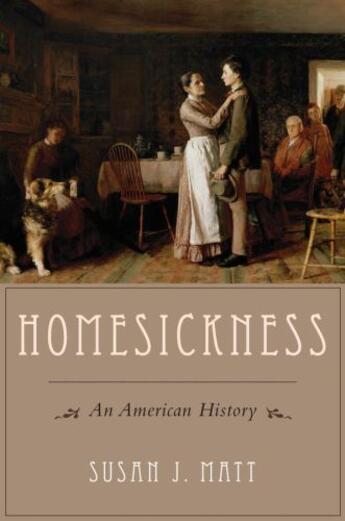Des idées de lecture pour ce début d'année !
Passionné(e) de lecture ? Inscrivez-vous
gratuitement ou connectez-vous pour rejoindre la
communauté et bénéficier de toutes les fonctionnalités du site !

Homesickness today is dismissed as a sign of immaturity, what children feel at summer camp, but in the nineteenth century it was recognized as a powerful emotion. When gold miners in California heard the tune "Home, Sweet Home," they sobbed. When Civil War soldiers became homesick, army doctors sent them home, lest they die. Such images don't fit with our national mythology, which celebrates the restless individualism of colonists, explorers, pioneers, soldiers, and immigrants who supposedly left home and never looked back.
Using letters, diaries, memoirs, medical records, and psychological studies, this wide-ranging book uncovers the profound pain felt by Americans on the move from the country's founding until the present day. Susan Matt shows how colonists in Jamestown longed for and often returned to England, African Americans during the Great Migration yearned for their Southern homes, and immigrants nursed memories of Sicily and Guadalajara and, even after years in America, frequently traveled home. These iconic symbols of the undaunted, forward-looking American spirit were often homesick, hesitant, and reluctant voyagers. National ideology and modern psychology obscure this truth, portraying movement as easy, but in fact Americans had to learn how to leave home, learn to be individualists. Even today, in a global society that prizes movement and that condemns homesickness as a childish emotion, colleges counsel young adults and their families on how to manage the transition away from home, suburbanites pine for their old neighborhoods, and companies take seriously the emotional toll borne by relocated executives and road warriors. In the age of helicopter parents and boomerang kids, and the new social networks that sustain connections across the miles, Americans continue to assert the significance of home ties.
By highlighting how Americans reacted to moving farther and farther from their roots, Homesickness: An American History revises long-held assumptions about home, mobility, and our national identity.
Il n'y a pas encore de discussion sur ce livre
Soyez le premier à en lancer une !

Des idées de lecture pour ce début d'année !

Si certaines sont impressionnantes et effrayantes, d'autres sont drôles et rassurantes !

A gagner : la BD jeunesse adaptée du classique de Mary Shelley !

Caraïbes, 1492. "Ce sont ceux qui ont posé le pied sur ces terres qui ont amené la barbarie, la torture, la cruauté, la destruction des lieux, la mort..."